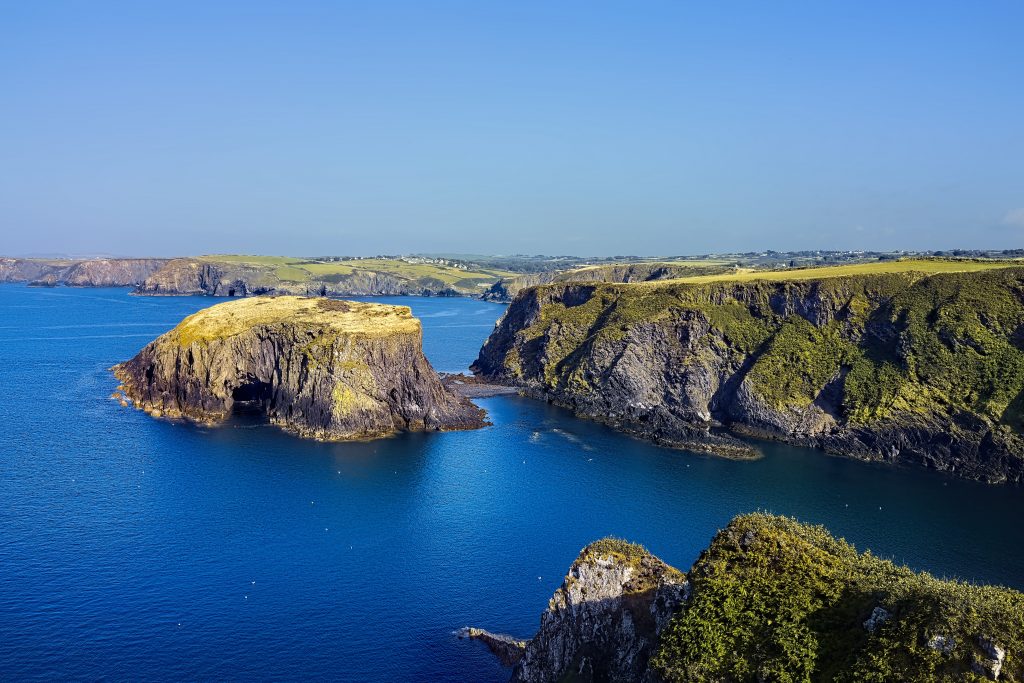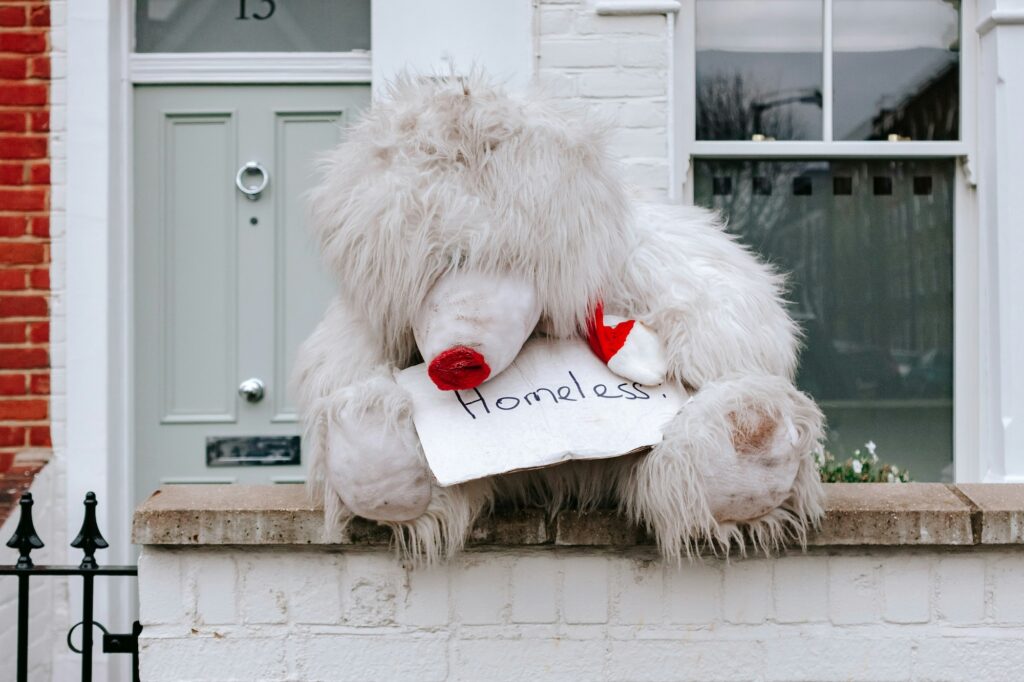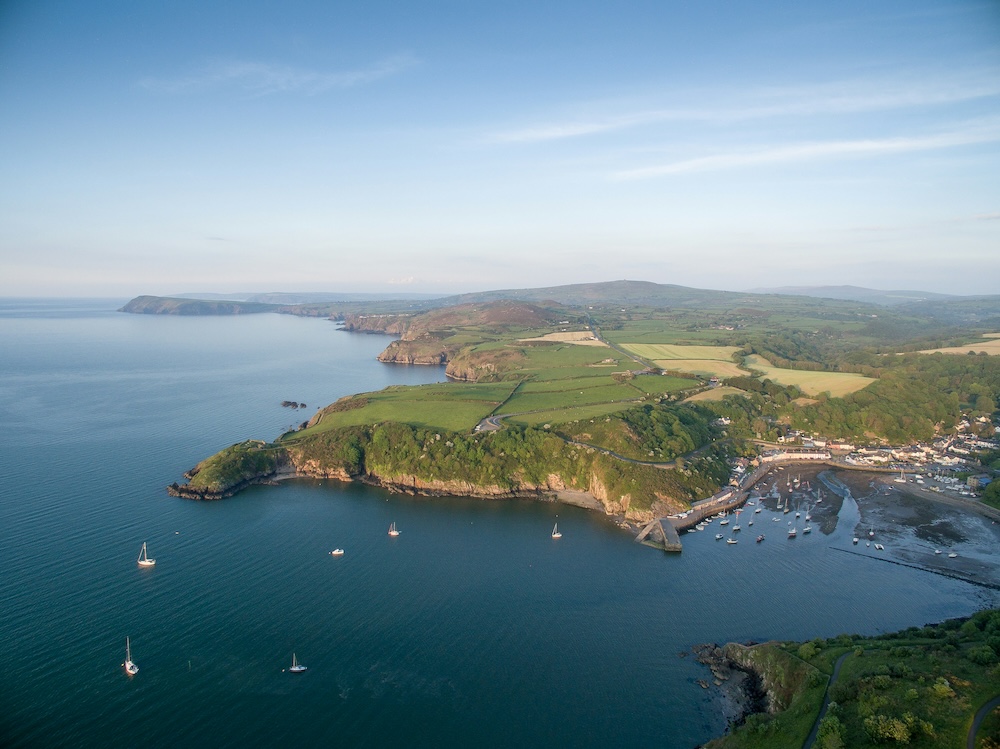“Some people simply choose a destination for their holiday and just go there. How come I end up in places that I’ve never thought of, and never even heard about?” Edin Suljic writes about Wales in the winter.
How many steps are there from St David’s Cathedral to the top of the hill where the narrow streets begin? Thirty-nine or forty? I couldn’t tell you now, but I climbed and counted them. There was a bookshop at the top and I talked with a woman who worked there about the steps, and books, where I come from, and London.
Not exactly a man-on-the-run story, but a few days earlier, I had missed my lift, so in order to get there I had to take a convoluted route by train from Paddington and then by bus from Fishguard. Not that much is needed for a writer with a vivid imagination to begin an adventure. I was travelling through a new country on a misty day in December and memories of events in my own past seemed to be stirred by this land.
Christmas mass at the Cathedral, a walk on Boxing Day to blow the cobwebs away, this time through the shrubs of St David’s Head and out to the edge of the Irish Sea, to watch surfers braving the cold wind.
And then a stroll back under the moonlight, staring at the frosted branches of a tree resembling a human head as if drawn by Cocteau, and thinking about my late friend.
In between, we drank a lot of wine and some of us spent the entirety of Christmas Day in the bathtub. By the end of the day, water started dripping through to the sitting room below, where the remainder were huddled by the fire. And yet, by all accounts, I had no business to be there – and it was the first time I had visited this place. I was there to help my new-found friend, an Englishman who took me under his wing shortly after my arrival in London, to facilitate his Christmas house-party. The house that had once been a convent was at the time being run as a place for retreats by a lovely, dysfunctional Welsh family. She worked like a pit pony, while he charmed the guests and drank away the profits.
Some people simply choose a destination for their holiday and just go there. How come I end up in places that I’ve never thought of, and never even heard about? And yet, I am complicit in making all this happen.
A few years earlier, I would have been pressing the hands of familiar souls and hugging friends after Christmas mass; only now, I’m coming out of St David’s Cathedral inhaling sharp air on the edge of this unknown world, with a heavy heart, wondering if I’ll ever see any of those old friends again.
Who creates these trajectories for our lives, which seem so out of place, so random? Who creates these occurrences taken so much for granted? Events after which we can only shrug our shoulders and say, ‘That’s life’.
Is it the same force that made other humans build an impossible railway line, up and up ragged Welsh coasts from one place with an unpronounceable name to the next?
And the train clickety-clacks and the rain raps tap-tap-tap on the carriage window as the rail tracks keep running away, chased by the ever-closer sea, while the sky is getting lower and lower.
I’m on my way to visit a woman who was once my girlfriend. And not exactly to visit, rather to stay in the house where she lives with her family—her husband, who is a Welshman, and their two young children – while they are away.
So, the invitation was more like: ‘Why don’t you get out of London, stay in our house and take a walk in the hills?’
I haven’t been invited there ever before, nor are we really friends now, nor do I know her husband, nor any of their neighbours. But we were once in love, and burned flesh has its own pulse. Besides, we were both runaways from a terrible war in our old country. A war that both of us dreaded and after which we found ourselves to be from two different, newly formed countries. But for some years now, we’ve been living in Britain and getting on with our separate lives.
We come from a country where the names of places can be packed with consonants. But we write the words as we say them. That can take away the magic, and we make up for it by lyrical naming. I remember another train journey, which we took together through Terra Incognita, as I now call the country of my birth, former Yugoslavia, from Pula to Neoplanta, passing through towns with names meaning things like Port of Roses and Vineyards of Karlovac – still, nothing like Penrhyndeudraeth.
There are many stations with equally difficult names en route, with several trains to change, before you arrive from Paddington. And then even further to the house, a low, white farm cottage, beyond which is a path that leads up to the hills.
‘Call me if you need anything,’ said their friend who picked me up at the station, as we parted in the fading light.
This plain, from which steep hills quickly rose up towards the clouds, reminded me somehow of my homeland and my last hike there, several years before, to the ‘Matterhorn of Prenj’.
Then I was eager to drop off my haversack at the mountain hut and charge up to the summit before darkness. This time though, I felt the weight of the world on my shoulders, as I finally started to wonder whether there had been any reason for coming all the way here to this strange place in a strange country.
Alone, I searched for anything comforting that might stop me from slamming the door on this house and charging all the way back to London. As if there was a safe place to be. However, there is no way to slam the door on one’s past. I found two cassette tapes, one of them with music from Kusturica’s film, Arizona Dream, and I played it for a while. Then I looked for a place to sleep.
I wanted to find a safe, protected spot, and in the end I opted for a bench by the bookshelf, piling on some blankets for comfort and warmth.
In the morning I made coffee and was sitting at the kitchen table when a hand pushed in and opened the low, wide window above the sink, and a young man, a teenager, climbed in, landing right by my chair. He was not particularly fazed by my presence, unlike me by his. It all happened so quickly that I could only stand up and stare at him. Just as I’d begun to feel that I was no longer a man on the run, and that I might begin to relax in this newly familiar setting, I wondered: am I now supposed to protect this house from an intruder – or is he only a messenger?
It turned out that he was a neighbour, a friend of the family; I was told this by the woman who had driven me from the station, after I called her; but I never found out what made him come into the house. He might have been an elf for all I knew. I did wonder about it for a while but then there was nothing more unusual about his presence than mine in that house.
I’d left a part of the world where I’d thought I had it all planned out. Then, forces of a different kind had ripped apart most of what I’d thought was my natural human ability to control events, and since then, for better or worse, I’ve stopped mapping out my future.
I come from a land with parts not much dissimilar to parts of Wales – forests, mountains and mines; its people dependent on land, immersed in producing and extracting the stuff of life from the earth. And when a farmer or a miner comes home from work, he is full of wonder, he’s been challenged by the elements, he knows of the forces of the bigger world and he respects them. He knows of giants and dwarfs, of magic and invisible strengths. He is often guided and protected by good spirits.
Unlike the warrior, who must surround himself with a castle in order to feel safe, a farmer or a miner lays his head down lightly, feeling safe under the cover of heaven.
I’ve learned to be wary of men with grand projects.
There was a Welshman who, when he returned from travels abroad, went on to recreate something of the beautiful places he’d seen in these ‘otherlands’. For him, it was no longer enough to dream about cities set in a fog, perched on cliffs, populated by fairies and beasts. He wanted to prove that he could build them for real. The fairies and beasts had mostly left his own land, save for a few, and the occasional mad bard marching up and down poking the Welsh land with his stick, and spouting his verses whenever he feels that the world is about to end, or where a fresh keg of ale is being opened.
And another kind of (Welsh)man that I used to know was called Lala, who was a poet. He was more of a kind of a giant, really. You had to run in order to keep up with his walking pace. There was no way to keep up with his mind though. He would talk about many things as we walked together in London. Once, he was telling me about a church in Putney as we were passing it, where debates were held and all the important leaders of the Civil War met. That was a Welshman teaching a foreigner English history. We were going somewhere and I was concerned that we’d be late. ‘You don’t have to worry as you walk,’ he shouted, marching ahead of me, ‘Your legs will take care of getting you there and you better get on with composing a poem in your head… Think of what you see in passing or something you remember.’ ‘All right,’ I said after few minutes of fierce walking, ‘I’ll give you a poem about a friend’s allotment I was on yesterday:
‘We were giving each other an eye—
a robin and I,
over a patch of my allotment—
both of us fretting:
he by his nature and I from an urge
to be kind to this creature.
But he wanted me just to keep sweating
over my toil—
leaving him unto his own—
to the earthworms that coil.’
‘You’re doing great subversive work, boyo,’ he said, ‘Allotments are almost the only true legacy left from the Civil War.’ But then, Lala wasn’t your ordinary man, but one of the last giants that had populated those lands long ago.
That much I do remember. I don’t remember any more whether it was with him that I went to yet another part of Wales, where some more castles had been restored and galleries opened, and glass blowers held court. But I do remember asking people there, who I don’t remember any more, if it is true that a Welsh person can never say ‘no’ or ‘I don’t know’ to a stranger, so as not to offend them.
Ah, us humans, we go a long way to collect memorable moments in our own lives. But then, just like ancient mosaics, some bits are missing, and that void is what keeps the rest of a mosaic together. Those blank moments in our memories might just be the places where the memories of others intersect; so someone out there knows exactly what has happened.
And then… The first time I was ever in Wales—somewhere on a creek, near Sandy Haven, on a boat hidden between dunes held together by patches of spiky grass, looking across muddy flats, scraping off old paint from a boat’s weathered planks, sleeping in its belly, all six feet-plus of me, folded alongside two friends who brought me there, to their pride and joy – this creaking boat – in their other pride and joy: a Scimitar car. We ate tinned sardines and drank warm wine while watching the sunset. The boat never sailed and the Scimitar was scrapped soon after.
But on our way back to London, we stopped on the top of the cliffs above St Gowan’s chapel, abandoning the car and then ambling down the steep path. The chapel cut into the cliff in a way to outdo time and the rough sea; waves breaking on rocks, soaring towards the sky. We stripped off and dived into the water. I waited for the waves to pull back before jumping in, coming out with only a single slight scrape across my ribs. It never healed.
BELONGING TO WALES / PERTHYN I GYMRU is a new series featuring extraordinary stories from ordinary people across Wales and beyond.
The first four contributions are taken from an e-book of multilingual stories about arriving in Wales by Meltem Arikan (Turkish), Marie Darrieussecq (French), Edin Suljic (ex-Yugoslavian, English), and Jörg Bernig (German) – with English and Welsh translations. These texts were commissioned by Dr Kathryn Jones of Swansea University’s Department of Modern Languages, for the AHRC-funded research project ‘European Travellers to Wales 1750-2010’ at Bangor University. Reader responses on these stories are welcome. Email [email protected]
Photo by Niklas Weiss on Unsplash
We are also actively seeking submissions to the series. Email [email protected]





